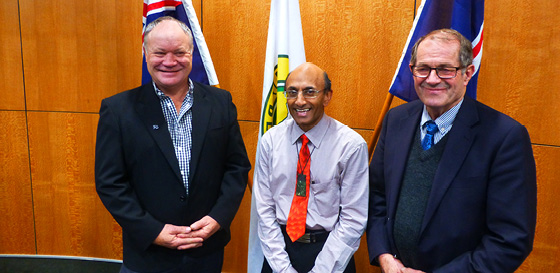Ruapehu decision makers challenged on economic development thinking
Dr. Ganesh Nana the Chief Economist from independent economic research consultancy BERL was in Taumarunui this week challenging Ruapehu decision makers on how they think about economic development and council's role in it.
Dr. Nana was in Ruapehu at the invitation of council to run a special workshop on economic development with council elected members, staff and representatives from business and agriculture.
Ruapehu Mayor Don Cameron said that having experts like Dr. Nana challenge our thinking about economics and economic development was a critical part of the vital conversation that Ruapehu stakeholders needed to keep having amongst ourselves.
One of the key issues highlighted by Dr. Nana is that we tend to talk about economic development from a too narrow perspective when in fact everything that council does supports economic development, he said.
In his view, economic development is not just about dollars and cents but about our key resources of land, climate and people and how we put these together to create a better tomorrow.
He also highlighted the importance of measuring outcomes over outputs and keeping a focus on the medium to long-term.
This means not simply measuring growth but also having measures for the quality of life that Ruapehu residents have and understanding that the payoff from many of activities we do may not be immediately apparent.
The NZ Treasury's Statement on NZ's Long-Term Fiscal Position He Tirohanga Mokopuna' (The Well-being of Future Generations) has five such measures being; economic growth (jobs, etc.), sustainability (can we continue to do what we are doing), equity (is wealth being shared), risk (are we making things worse for tomorrow) and social cohesion.
Mayor Cameron said that council's thinking on what economic development means was broadly aligned with these outcome measures.
Council has developed a Social Policy that it will be consulting on shortly that aims to provide a similar range of measures including the social impacts of council decisions, social resilience, and unintended consequences.
As the territorial authority for Ruapehu we have a stewardship role with a long-term objective to help people live better lives, now and into the future, he said.
We all want to see expanded opportunities and capabilities for Ruapehu communities that increases their well-being on a sustained basis.
While we cannot do it alone, and there are factors outside our control, council is of the firm view that we have an important role in helping to facilitate these outcomes.
*End*


